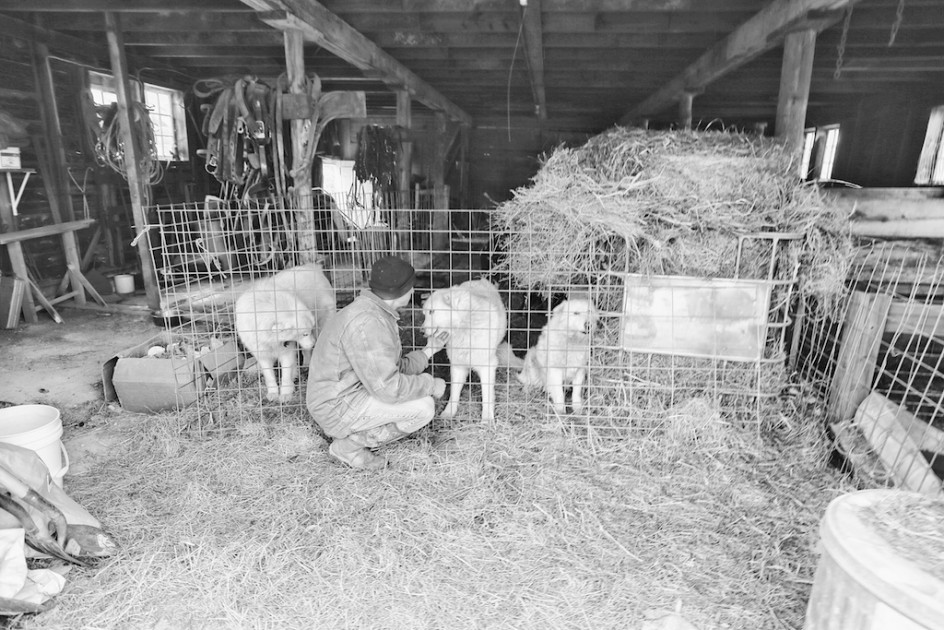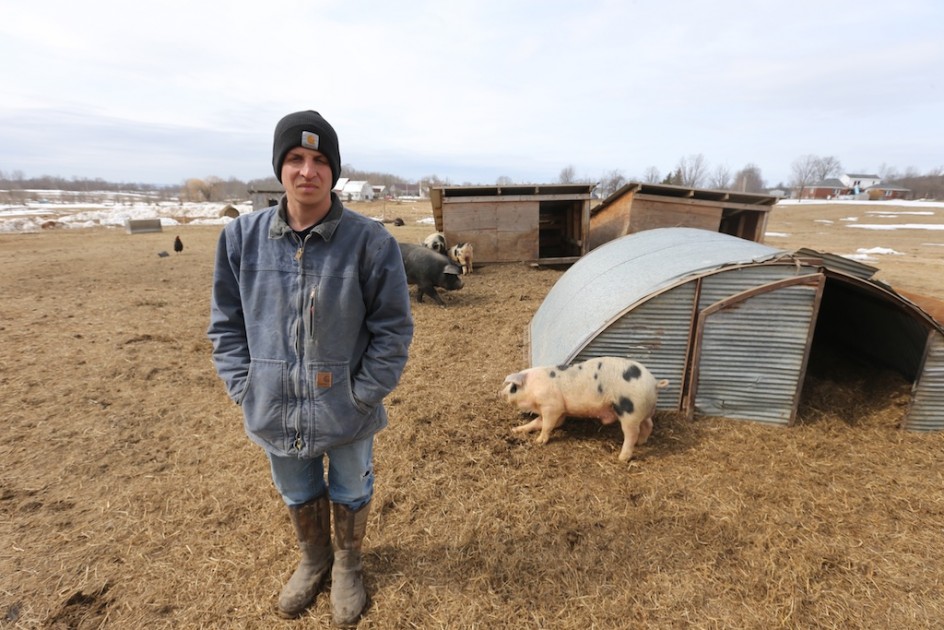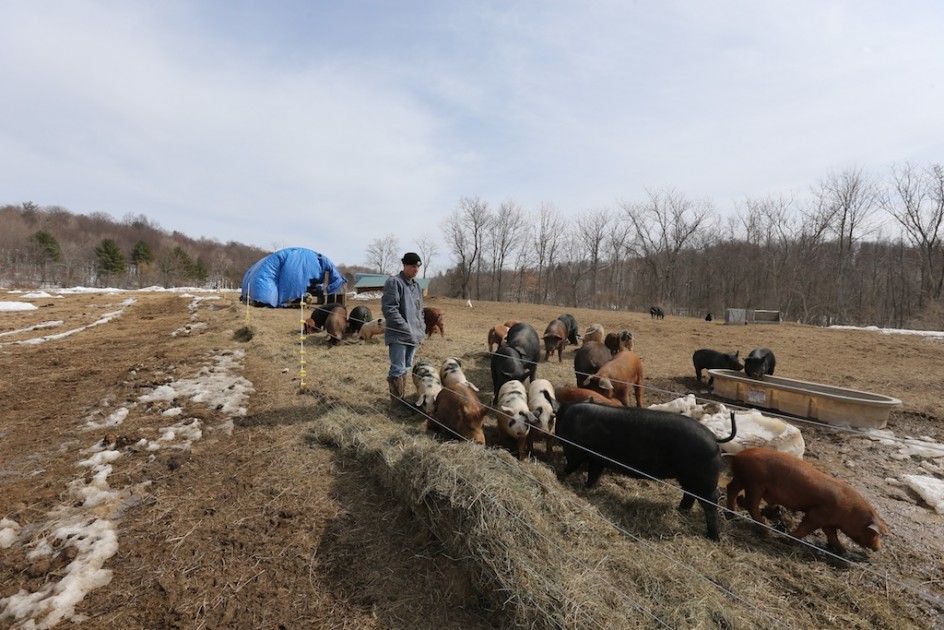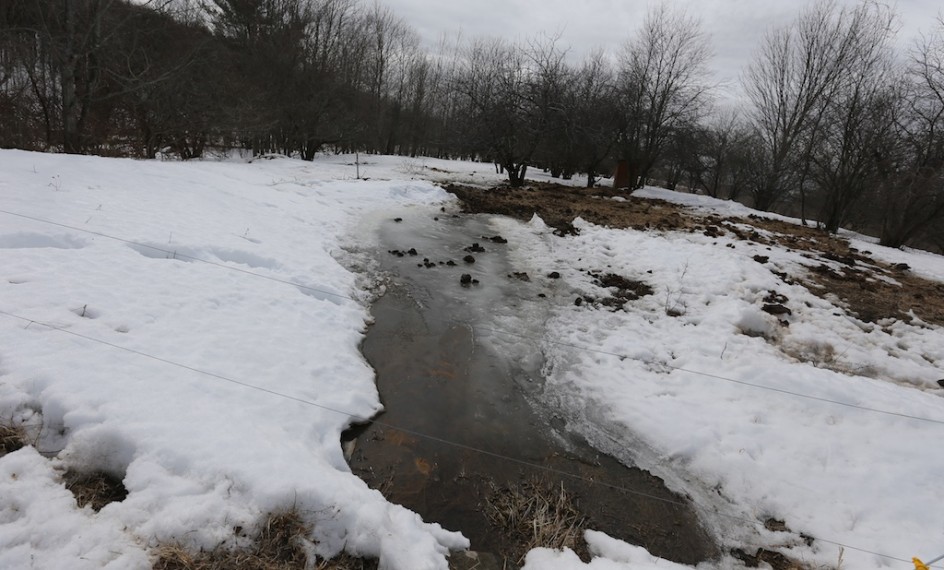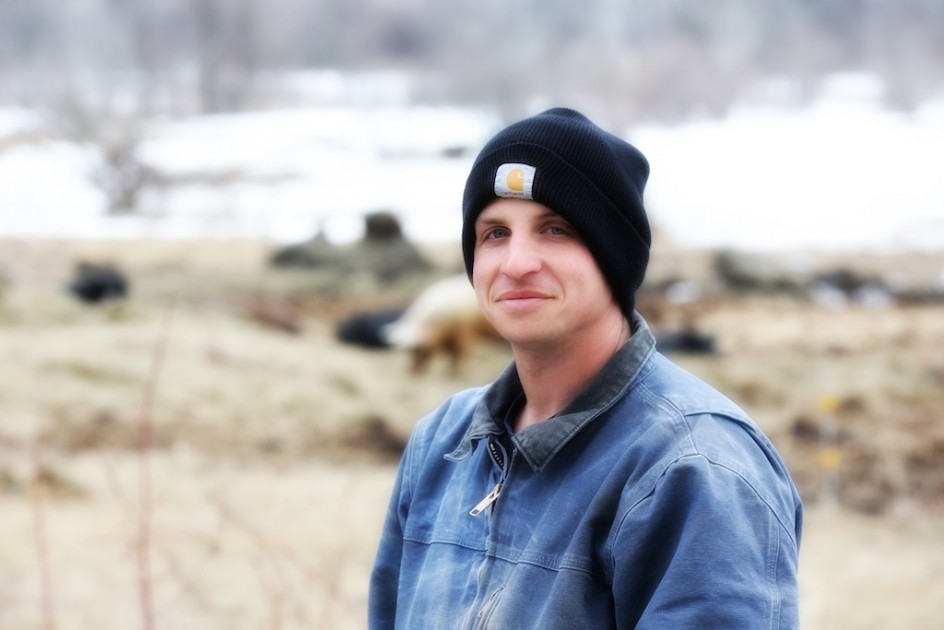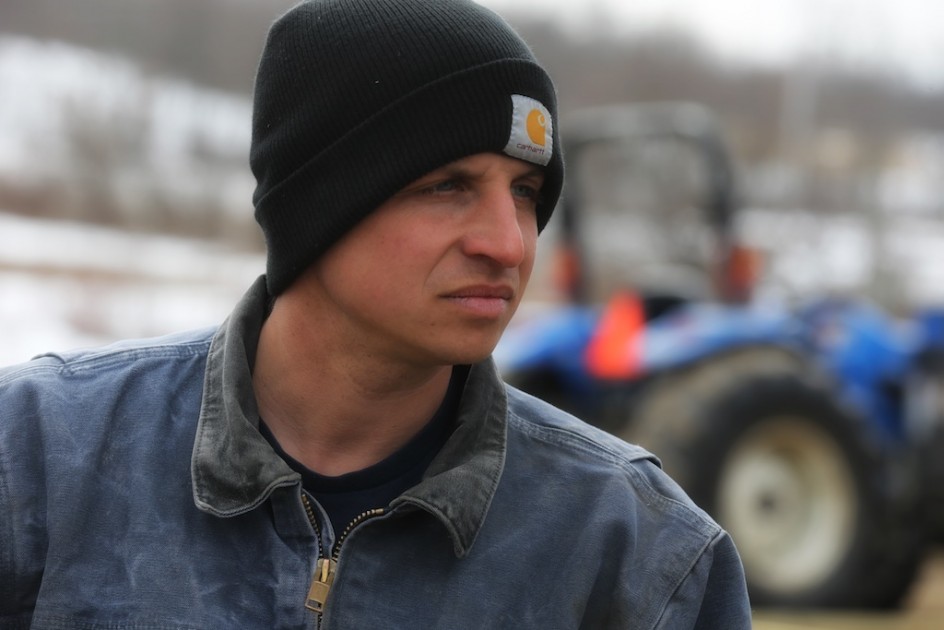
“Whatever is my right as a man is also the right of another; and it becomes my duty to guarantee as well as to possess.”
― Thomas Paine, The Rights Of Man. You can help a man here.
__
Tomorrow is Joshua Rockwood day here at Bedlam Farm.
It is an important day in my life, and I believe, in the life of everyone who lives with animals, loves them, or truly cares for their rights or their own. Joshua Rockwood, a young and idealistic farmer drawn to the local foods movement in Glenville, N.Y. goes to court to face 13 counts of animal cruelty, abuse and neglect. His hearing begins at 5:30 p.m. at the Glenville, N.Y. Town Court.
His trial speaks to the lost soul of the animal rights movement, our broken covenant with farmers and animals, our disconnection from Mother Earth.
Rockwood’s farm was raided by local police and animal control officers. He is accused of having frozen water sources, of neglecting the hooves of his ponies, of failure to provide heated barns and shelter for his pigs, and of having inadequate stores of feed. Three horses and one dog were taken from him.
Everyone who knows him, who lives on a farm, who is a farmer, who lives with domesticated animals, who understands the lives and needs of animals, also understands what his real crime is: he was a young farmer in winter, trapped in runaway social forces that threaten every farmer and animal and animal lover in the world.
Rockwood symbolizes much more than his farm and his animals. His arrest was wrong. He brings into the focus what is truly at stake in his trial: his way of life and our way of life, those of us who believe that animals ought to remain in our world and live and work with us. Those of us who would not abandon our farmers to this thoughtless and unknowing kind of justice. The increasingly hateful ways in which we treat one another.
I am not a political person. I do not believe in the left or the right. I believe that government is necessary to protect us and our freedom, to preserve our property, to help the poor, to educate the young, to regulate the world of business, to help save the earth from our own deprivations. I abhor war in any form, I suppose many people would call me a progressive.
Thomas Paine has always been an inspiration of mine. I am especially touched by his passionate belief that my rights are also the rights of every man and women, my duty as a writer and a citizen is to support the right of others as well as support my own.
I also write as an author and a life-long lover animals. I have lived with them and written about them for decades – dogs, sheep, donkeys, goats, cows, barn cats, chickens, goats. In the past year, I have been drawn to the struggle of the New York Carriage Horses to survive in the new and twisted world of animal rights, where we kill animals and drive them from the every day world in order to save them. In this twisted process, the rights of every living thing is trampled, theirs and ours.
The horses have awakened me, and then the ponies in the farmer’s markets, the elephants in the circuses, the pigs and chickens and cows on a farm, the dogs and cats of the homeless and the poor and the elderly, the sled dogs and the border collies. I have come to see that animals are not all different and separate things, they are one thing. Them together, them with us. The sunshine soldiers of the animal world are selfish and selective in their righteousness. They mostly seem to care about what makes them feel good, not what saves the animals. Take the elephants, not the horses. Take the ponies, not the dogs. Take the animals in Hollywood movies, not my cats.
But you cannot take one withou the other, the story is the same every time. What is true of the carriage horses is true of the elephants, we don’t get to pick and choose which animal makes us feel better about our battered selves.
The sunshine soldiers of the animal world breath the air of the elite and the smug and the self-satisfied, turning their heads from the slaughter and disappearance of animals, the true abuse and brutality of the corporate farms. And from our sacred and natural partners, from the earth. We destroy one world and habitat after another. First the natural worlds, then the few remaining ones that we have created, the last refuge of the animals. They will share our fate.
What the people who profess to speak for the animals and the the ponies and the elephants is this: stables and zoos and circuses and farmer’s markets and lives with humans are the new preserves, are the new natural world, are the new wild, their only remaining safe and protected homes.
There is nothing more natural in all of the earth than for animals and people to remain together. They speak to us of healing, harmony, nature and history, we stand or fall with them, not apart from them.
I have opened my heart and mind to see that this issue is larger than the carriage horses, or the elephants in the circus, or the border collie in the field. Freedom, rationality, science and a way of life is under siege. The very idea of progressiveness has been stained by hostility and elitism and ignorance.
For all of recorded history, men and women have lived with animals – not just pets – and loved them. They have fed us, sustained us, protected us, entertained and uplifted us, worked with us, built our world with us, grounded us, touched the hearts of our children, nourished our imaginations, our art and culture. There is no part of our lives animals have not touched, no element of art or creativity that they have not inspired, no work that they have not willingly done with us and for us.
Animals are not just pets, they do not need to be seen as pets, they are something much larger, more spiritual and mystical.
All of this is in danger of being taken from us, as well as our sacred and hard-won right to be free of fear and intrusion, to live as we please, to follow our bliss and passion, not be forced by others into lives we do not seek or want, or to conform to repugnant and alien ideas about the natural world.
When you awaken, you see that one by one, everything that is good about animals and people is becoming a dark thing, a crime, a target of the new and Orwellian animal police, this new and narrow and angry way of looking at the world. We have been manipulated. Much of what we do with animals – working with them, laughing with them, is being called abuse, is turning our connection to them and with one another poisonous and angry and hateful. Abuse is becoming the only way we can see animals, the only way we consider and understand them, even though it is the smallest and in many ways, least relevant thing about their lives and existence.
A loved and healthy carriage horse is now considered a victim of torture and cruelty by the mayor of New York. An elephant in the circus is a pathetic object to be saved by humans sitting at their computer screens thousands of miles away. Carriage drivers – many of their families have worked with horses for a thousand years – are told they must drive green taxicabs in the outer boroughs when their horses are taken away. The mayor refuses to speak with the carriage drivers or see their stables, he says their work is immoral. See, he says? No one will suffer, no one will care when the horses are replaced by more cars.
I sometimes imagine the weeping soul of Frederick Law Olmstead, who designed his beautiful Central Park so that people could see the carriage horses every day and walk among them, shaking his head in wonder at the idea that they can be replaced by big cars and no one will notice or care. I don’t know which thing is worse, that this is true, or that it isn’t. We have forgotten the animals, they are pleading with us to remember them before it is too late. Our children will never forgive us for these awful mistakes, they can never be undone.
Even the ponies who give rides to children are seen as nothing but victims. It is an outrage for animals to feed the world, for a homeless man to have a canine companion in his tent or van, for a loving and elderly woman to have cats in her trailer, for a couple without a tall fence to adopt a dog, for the elephants to walk and kneel in the circus, as they have for thousands of years. A new generation of secret informers roams the animal world waiting to turn farmers and animal lovers into criminals, beset by a new generation of animal police.
There is abuse in the animal world, as in our world, for sure, but it is only part of the story, and a small part. The amazing things animals and people do together are suddenly dismissed and denigrated as stupid tricks, unworthy of sensitive and intelligent beings. So we smugly condemn them to death instead, pretending that there is a natural world for them to return to, and a safe life there. And we pat ourselves on the back and send out the informers again to seek out another animal to push out of the every day lives of humans, and from the earth.
We call this animal rights when it is just the newest form of animal genocide.
Every animal we save and keep in the world now is sacred, a victory for them, for us, for the earth. If we don’t awaken, they will all be gone, every one. Every animal we lose is a tragedy, this is the ancient message of the horses, calling us to open our eyes and save them.
The ironic truth is that the carriage horses and elephants are – or were – among the safest and luckiest horses and elephants and animals on the planet, anyone who knows a thing about them will say the same thing. There is nowhere for them to go that is better.
And make no mistake about it, when they get rid of the horses and the elephants and the ponies and the sled dogs and the dogs and cats of the poor and elderly, they will come for your dogs and cats, for our pets, because no one who loves animals really fits into the new definition of animal welfare and animal abuse any longer. Animals lovers were never consulted about this new way of looking at animals, nor are they listened to.
The secret animal police do not know one animal from another, have no idea what they need or what their real lives are like. They do not care about the people who live with them and love them. If you own animals and work with them, you are just another subhuman, a criminal waiting to be found out, you are an unperson, you can be informed upon, raided by the police, hauled into court, bankrupted and disgraced and shamed.
Farmers and carriage drivers and pony ride operators and the people in the circuses and the people who love animals now live in an Orwellian world.
Orwellian refers to an attitude and policy of intimidation and draconian control of issues by propaganda, surveillance, misinformation, denial of truth, and manipulation of events. It describes the targeting of the “unperson,” someone who is publicly denounced on modern media, whose past existence is expunged from the public record and memory, who is arrested by police with great authority, and who is thus disgraced and discredited. The dehumanizing of people, wrote Orwell, is a common practice of repressive governments.
It describes what has happened to Joshua Rockwood and what is happening to so many others.
So this is what is at stake for Rockwood tomorrow – and for us. Rockwood is a sensitive man, an ethical farmer, an open and transparent man. He loves his family, is straight with his customers, cares for his animals. He is not a saint, he is not perfect, he is learning things every day. His passion is making healthy food to sell to people in his community, an alternative that is desperately needed in the world of dreadful nutrition, barbaric corporate farming and the new industrial and corporate agri-business. I would be proud to have him in my family, to call him a friend or neighbor.
Like almost ever farmer in the Northeast – like me and every farmer I know – he was unprepared for temperatures that ranged into the – 20’s night after night. Two of his pigs may or may not have gotten frostbite on the tips of their ears – I saw them two weeks ago, they are healthy and fat. So are the 100 other pigs I saw on his farm. One of his ponies had overgrown hooves – my farrier says they were not even close to being unhealthy or dangerous.
On the same day he was raided, the sewer pipes in the Glenville Town Building (and police headquarters) froze and the sewage backed up. No one was arrested or charged with cruelty and neglect. None of Joshua’s cows, chickens, pigs, dogs or sheep suffered any serious or death as a result of the winter. He got them all through it.
If animals are to survive at all in our greedy and destructive world, it will be people like Joshua Rockwood who save them and keep them here.
Or the carriage drivers in New York. Or the pony ride operators in the farmer’s markets. Or the people whose therapy dogs make children and the sick and elderly smile and laugh – do those stupid tricks – in hospitals, schools and nursing homes. They are not different things, they are one thing. One woman’s “stupid trick” is the salvation of a sick child or an old man stuck in a dementia unit in a nursing home.
I am called to stand up for my idea of justice and for the humane treatment of people and animals. And for the right of everyone to pursue their passion and way of life. Everyone must come to their own truth. It is not the role of government to take away our freedom or property or way of life, it is the role of government to preserve all of those things. In any great undertaking, especially in our world, it is no longer enough for any man to simply depend on himself.
At Joshua’s hearing last month, nearly 300 people, many of them farmers who knew it could be them next time, showed up to support him in court. He appeared stunned and determined. He also has a calm and sense of purpose about him. I am eager to see him tomorrow and shake his hand and give him a hug or a pat on the back. Later this week I hope to go to his farm and see and photograph the new baby animals that have appeared there this Spring.
Whatever is my right is also the right of Joshua Rockwood. His only crime is to be a young farmer, starting out. I am certain he will prevail and return to his destiny and his way of life. Joshua’s legal defense fund has raised more than $55,000 so far. You can help him here.
Tomorrow is Joshua Rockwood day here at Bedlam Farm, and in my heart. I hope others will hold him in the light and open their hearts to the animals in world. Perhaps consider a Joshua Rockwood day for you and for your dog or cat or horse or pony or pig or goat.

